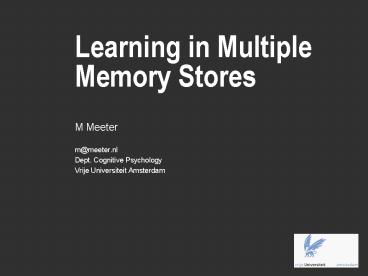Learning in Multiple Memory Stores - PowerPoint PPT Presentation
1 / 22
Title:
Learning in Multiple Memory Stores
Description:
operant. behavior. What memory is for. Meeter, Myers & Gluck (2005). Psych Rev. Context change ... Is that really a memory phenomenon? model explains data ... – PowerPoint PPT presentation
Number of Views:41
Avg rating:3.0/5.0
Title: Learning in Multiple Memory Stores
1
Learning in Multiple Memory Stores
- M Meeter
- m_at_meeter.nl
- Dept. Cognitive Psychology
- Vrije Universiteit Amsterdam
2
A neuropsychologists memory (10 years ago)
neocortex semantic memory
hippocampal region episodic memory
cerrebellum classical conditioning
basal ganglia instrumental conditioning
3
A neuropsychologists memory
neocortex semantic memory
hippocampus recollection parahippocampus familiari
ty
hippocampal region episodic memory
cerrebellum classical conditioning
basal ganglia instrumental conditioning
4
A modelers memory
neocortex
hippocampus parahippocampus
hippocampal region episodic memory
cerrebellum
basal ganglia
5
Hierarchy
Neocortex stimuli
Meeter, Myers Gluck (2005). Psych Rev
6
Familiarity neurons
parahippocampus entorhinal perirhinal cortex
Xiang Brown (1998). Neuropharmacol
7
Why memory?
8
What memory is for
Cerebellum classical conditioning
Meeter, Myers Gluck (2005). Psych Rev
9
Context change
huh ?
10
Early in learning
Cerebellum eyeblink conditioning
Meeter et al. (2005). Psych Rev
11
Early in learning
Cerebellum eyeblink conditioning
Meeter et al. (2005). Psych Rev
12
Latent inhibition
13
Latent inhibition
Hippocampus context stimulus
Cerebellum
Parahippocampus stimuli in context
Neocortex stimuli
14
Acquired equivalence
15
Acq. equiv. in humans
- The Fish task
Correct!
16
Stimuli fish faces
?
17
The Fish task stages
Stage 1 shaping
Stage 2 equivalence training
Stage 3 new consequents
Stage 4 transfer test
18
Acq. equiv. in humans
19
Second task stages
Stage 1 shaping
Stage 4 transfer test
Stage 2 equivalence training
Stage 3 new consequents
20
Effect on lures?
21
Conclusions
- Why multiple memory stores?
- different kinds of representations
- localist vs. global
- How do we see that?
- performance on associative learning tasks
- Is that really a memory phenomenon?
- model explains data
- associative learning changes memory
representations
22
Contributors
Mark Gluck (Rutgers U.) Catherine Myers (Rutgers
U.)
Daphna Shohamy (Columbia U.)
papers www.meeter.nl/m































